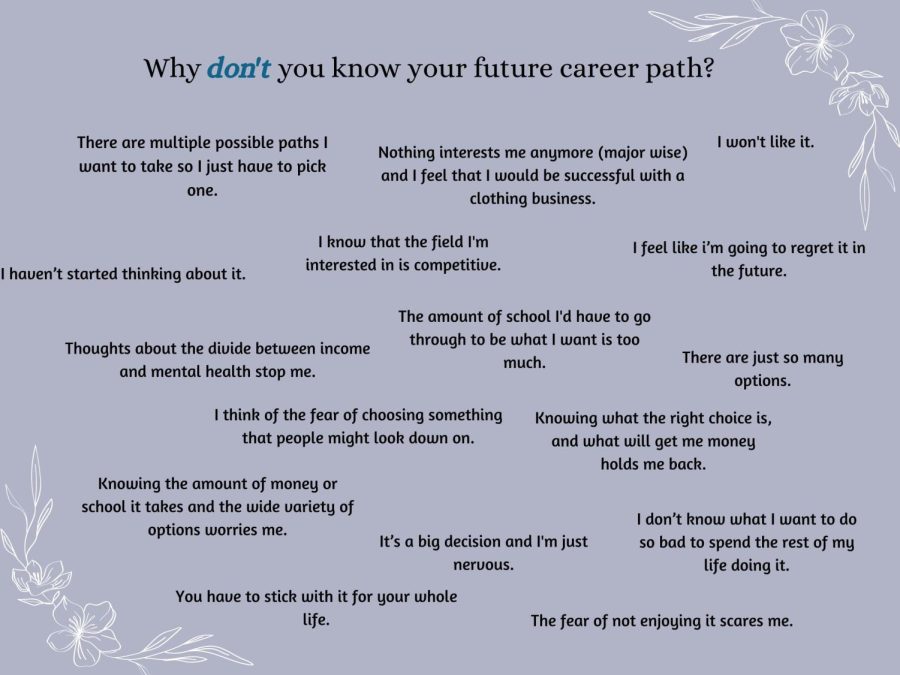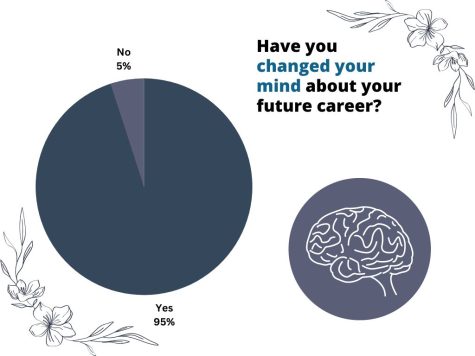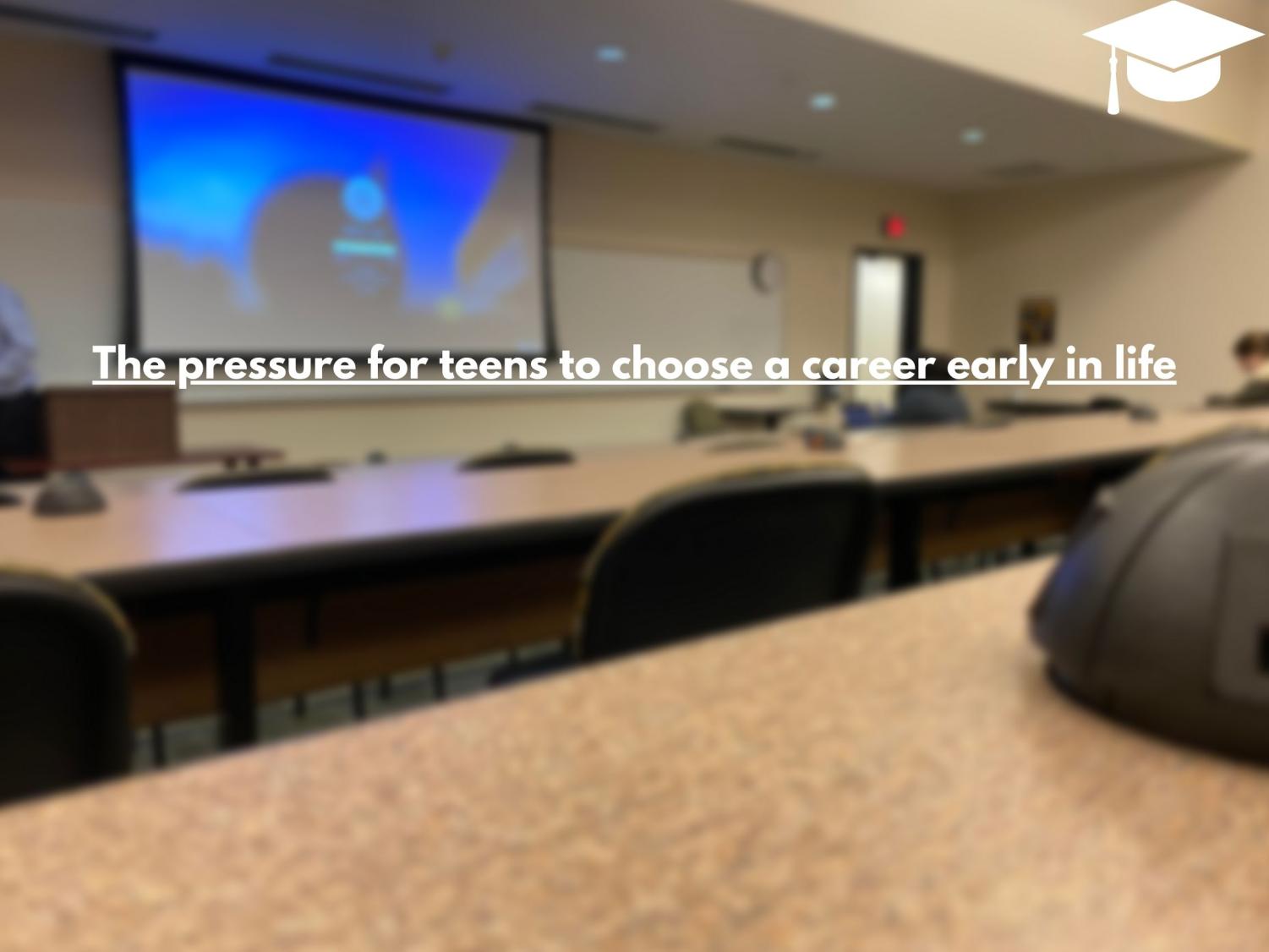Your donation will support the student journalists of North Cobb High School. Your contribution will allow us to purchase equipment and cover our annual website hosting costs.
The pressures of planning ahead
November 30, 2022
The dreaded question numerous teens face at an early age, “what do you want to be when you grow up,” affects their thoughts and puts them under stress about their futures. Teachers and school authorities push kids to find a career path early in school, causing students to feel pressured to figure out what lies ahead for them. When in high school, students do not withhold time to explore options and do not know what they want out of life quite yet. A vast majority focus on school and extracurricular activities, limiting their time to explore different options for their futures. Students would feel more comfortable in situations where less pressure resides on deciding their future at a young age.
Students fear that if they choose something in high school and decide to pursue it, they cannot change their minds later, as they excessively involve themselves in the topic of interest. They feel that since they devote so much time to a profession, it consumes their life and they cannot change their mind. This fear prevents countless numbers of people from completely settling on a choice early on, as they fear they will become stuck in a cycle for the rest of their life. According to a study from the Federal Reserve Bank of New York, 27 percent of college graduates choose to work in a job related to their major. Career journeys reflect a non-linear process; after each job experience, career fields can change. As people experience life, they find that their likes and dislikes change– meaning their interests in high school do not reflect their professional goals. Even when teens think they know their future, their ideas frequently change with the findings of new information or intriguing career paths.

“I’ve had a little bit of time here and there to focus on college. I kind of let the stress take over me so I decided to do all the regular decisions for college and no early action. I feel like I know what I want to do as a career. I really love writing, and I can see myself as a journalist but I hope that’s what fits me for the future,” senior Jessalyn Reinhart said.
Numerous people feel a sense of relief figuring out their fate in college, as it serves as a time for students to explore what they enjoy and take classes and learn about the adult world and themselves. Taking basic math and English classes whilst taking vague career pathway classes stands as a suitable option for plenty of freshmen in college while determining which elective classes they like best.
Putting career path classes on hold for the first year in college proves helpful for determining a future occupation; as freshmen join college, they likely do not know the general area they wish to work. Taking classes not related to areas of career provides them time and space to explore options. Credits required to graduate college include math and English; it stands effective to complete them in order to make time for career classes. After a full year or just the first semester of freshman year, a majority of students feel comfortable enough to begin classes that peak their career interests.

The general experience of existing in a college environment becomes beneficial for thriving on-campus students looking for new experiences. After taking classes and participating in clubs and other school activities, various people feel ready to move on and figure out what they want as a career, or even as a job to start out their line of work. Numerous may also find that their past thoughts do not remain desirable any longer.
“My favorite difference between college and high school is either being able to see friends a lot more and more easily or that there is less social pressure so it is a lot easier to be myself. I have been working on my career goals by planning ahead so I can take all of the classes that are important and that I’m interested in and also getting to know professors in my major to create connections that will be useful in furthering my education and creating career opportunities,” Wooster College freshman Boden Rutherford said.
High schools commonly require students to take career path finding quizzes to sort them into categories and foster ideas for possible jobs later in life. These quizzes display questions, then gather the results and organize it to best fit the person. They supply general ideas of what direction the person should head in for their future. A survey of 62 college and high school students concluded only 24 percent felt the quizzes helped them. In elementary and middle school, a handful of schools also host a “career day” to model important jobs that younger children look up to and look into eventually making it their reality. Career day invites students’ working parents to come into school for a day and present their job in a sense that kids admire. Schools aim to provide a variety of job presentations to advocate for a variety of students.
“I love to take quizzes and surveys because they’re fun, but the career ones do annoy me a little bit because it’s always the same boring thing. It’s always the same wide topic that doesn’t actually interest me, and so it kinda makes me feel like I don’t have anything I could do. Just being in the world has given me so many ideas and possibilities for what I want to do in the future but it’s always something that is in the back of my mind as a worry,” sophomore Leika Badstibner said.
Specific students feel that teachers and parents try to influence certain jobs that they think will gain success and pay well, instead of careers that will best fit a student’s future. Judgment transfers from mentor to student, especially when students express they do not want to attend college at all; this tends to make students feel unsure about their wants. Adults habitually frown upon teens who stand unsure about their set plans in general, causing discomfort and pressure on those teens.
Gap years entail taking a break from school– usually between college and high school– to reflect on goals and feel a better sense of self-understanding. Typically, those who take gap years will travel, work, intern or look for opportunities. Since college remains expensive, a plethora uses gap years as a way to take time to save money to spend on college. Numerous also feel that they want a break from the education system and wish to take time to try completely new things.
“I initially wanted to take a gap semester/year because I was feeling so incredibly burnt out from finishing high school and I knew jumping straight back into classes I wouldn’t do well, so taking a gap has definitely been beneficial to me. There’s also the fact that adapting to college life is so much to take in so quickly that taking this small gap is somewhat a way to ease into that. I have also been able to think more about what kind of career I want later in life, rather than having my entire life decided by an application I made when I was 17. Since I haven’t been busy with a school schedule, I have had much more time not only to enjoy bits of life I wasn’t able to before but also I have been able to look into schools and programs they have to really make an informed decision, a much more informed decision than one I would have made in high school when I was doing the bare minimum research,” alumni Michael Fusaro said.
Not everyone needs to obtain a college degree or work at all. Other opportunities, such as the military and self-owned businesses stand as options for anyone not looking to attend college, but still require amounts of hard work and dedication. A handful of careers do not need a college degree, but still, require training from workplaces and companies. Trade schools also interest a plethora of students ready for work in their intended areas. These trade schools specialize in specific topics, allowing top-notch and qualified training for each job. Common niches people learn at trade school include plumbers, electricians and beauticians.
The majority of schools fail to prepare students for their futures in areas such as paying taxes, raising a family and owning a home. These skills recognize that one will move on and must learn how to live independently. Since high schools do not normally provide classes in these areas, students either forget to learn them or find that they want to learn in college. This also prevents the urge to find their career path, as they prioritize other things about life first. A majority of students that take gap years in between college and before starting college use the time to figure out their paths.

Teens already experience enough, and the weight of their future starts to slow several of them down. After worrying about school, jobs and families, students remain expected to plan out their entire life after the age of 18, which includes no certainties. To improve students’ perspectives on their futures, schools can release the pressure put on the action to make decisions now.
